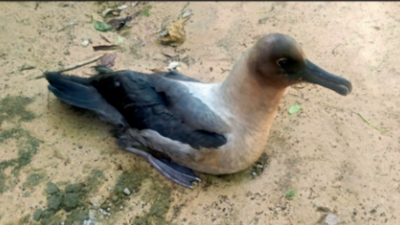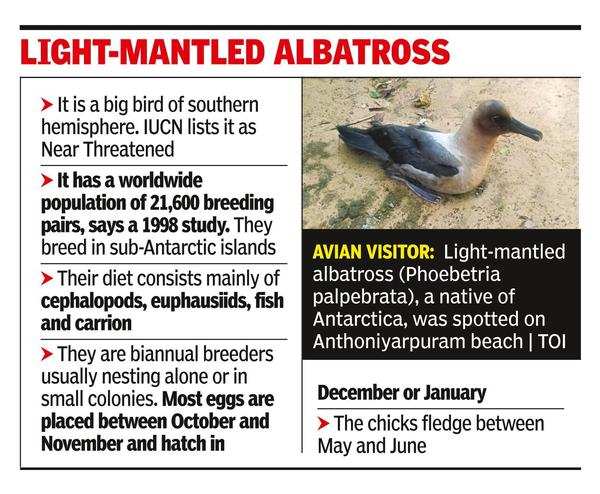- News
- City News
- madurai News
- Tamil Nadu: Antarctic bird sighted in Rameswaram
Tamil Nadu: Antarctic bird sighted in Rameswaram

Light-mantled albatross (Phoebetria palpebrata), a native of Antarctica, was spotted on Anthoniyarpuram beach | TOI
MADURAI: Two bird researchers have recorded sighting of a light-mantled albatross (Phoebetria palpebrata), a native of Antarctica, on Anthoniyarpuram beach in Rameswaram island on September 8, 2020. This was published in a peer reviewed journal called “Journal of Threatened Taxa’ on Tuesday. The bird which is listed as ‘near threatened’ on the IUCN Red List has not been sighted previously in south Asia or Oriental region.
H Byju of Centre of Advanced Study in Marine Biology, Annamalai University, and N Raveendran from Iragugal Amritha Trust in Madurai, who published it said it was a mystery how the large pelagic bird reached Rameswaram. When Raveendran and local fishermen spotted the bird, it was exhausted and unable to fly. The forest department and local fishermen took care of it, provided water and feed before releasing it again. “We were wonder-struck about this spotting because it is very unusual to find an Antarctic bird in this region. The bird was an adult, and we don’t know how it could have strayed into the Gulf of Mannar which is 7,000 km to 8,000 km away from its usual nesting sites,” said Raveendran.

These birds maintain a circumpolar distribution in the southern ocean, mainly south of the sub-Antarctic convergence. They breed on several sub-Antarctic islands and forage over cold Antarctic waters. The duo did exhaustive research about the bird’s straying before subjecting their finding to international peer review.
“We had to rule out any possible storms or cyclones that could have brought this bird here. But our study revealed none. So we sent our study for international peer review and they concluded that it is for the first time light-mantled albatross is found in India or Asia,” said Byju. Behavioural studies on the bird found that they have no association with high or low pressure systems in the atmosphere for foraging. The best assumption is that it strayed due to wind patterns or storms but there were no storms when the bird was spotted, the researchers say. In June, the duo had sighted Arctic skua, also known as Parasitic jaeger, in Dhanushkodi, its third spotting in Tamil Nadu.
H Byju of Centre of Advanced Study in Marine Biology, Annamalai University, and N Raveendran from Iragugal Amritha Trust in Madurai, who published it said it was a mystery how the large pelagic bird reached Rameswaram. When Raveendran and local fishermen spotted the bird, it was exhausted and unable to fly. The forest department and local fishermen took care of it, provided water and feed before releasing it again. “We were wonder-struck about this spotting because it is very unusual to find an Antarctic bird in this region. The bird was an adult, and we don’t know how it could have strayed into the Gulf of Mannar which is 7,000 km to 8,000 km away from its usual nesting sites,” said Raveendran.

These birds maintain a circumpolar distribution in the southern ocean, mainly south of the sub-Antarctic convergence. They breed on several sub-Antarctic islands and forage over cold Antarctic waters. The duo did exhaustive research about the bird’s straying before subjecting their finding to international peer review.
“We had to rule out any possible storms or cyclones that could have brought this bird here. But our study revealed none. So we sent our study for international peer review and they concluded that it is for the first time light-mantled albatross is found in India or Asia,” said Byju. Behavioural studies on the bird found that they have no association with high or low pressure systems in the atmosphere for foraging. The best assumption is that it strayed due to wind patterns or storms but there were no storms when the bird was spotted, the researchers say. In June, the duo had sighted Arctic skua, also known as Parasitic jaeger, in Dhanushkodi, its third spotting in Tamil Nadu.
FOLLOW US ON SOCIAL MEDIA
FacebookTwitterInstagramKOO APPYOUTUBE
Start a Conversation
end of article










